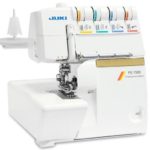The Japanese company Juki specializes in the production of industrial sewing machines, but in recent decades has also been offering household sewing machines and overlockers. The company's equipment competes with the most famous brands of sewing equipment and is known all over the world. They are characterized by ease of use, work with any type of fabric and high productivity. This review examines the most popular models of overlockers and cover sewing machines from Juki.
Juki MO-644D
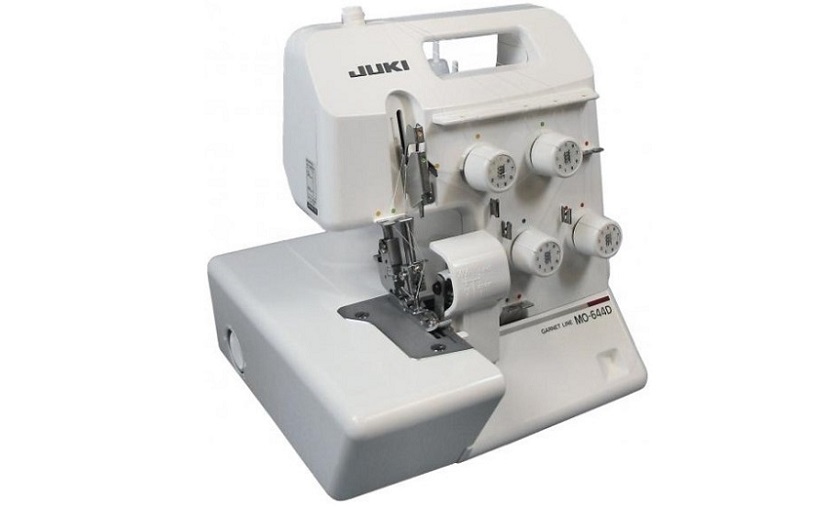
Model with 105 W operating power, differential and automatic looper threading. The thread tension is manually controlled. The system is equipped with a stabilizing mechanism of the puncture force, a cut-off knife, a regulator of the pressure of the fabric and the width of its cut.
The device works with 2,3, 4 threads. In total, it contains 8 sewing operations. Performs rolled seam and flatlock. The stitch is adjustable in length from 1 to 8 mm, in width from 2 to 8 mm. The foot rises up to 5 mm. Overlock will run up to 1500 stitches per minute. Colored markers on the body. Soft case.
Advantages:
- Does not vibrate during operation.
- The threading system is quickly learned.
- Good complement with accessories, convenient bag for their storage.
- Comfortable pedal.
- Stands firmly on the table during use.
- Easy maintenance.
Disadvantages:
- Dim backlighting.
- Does not include a sleeve platform.
Juki MO-654DE
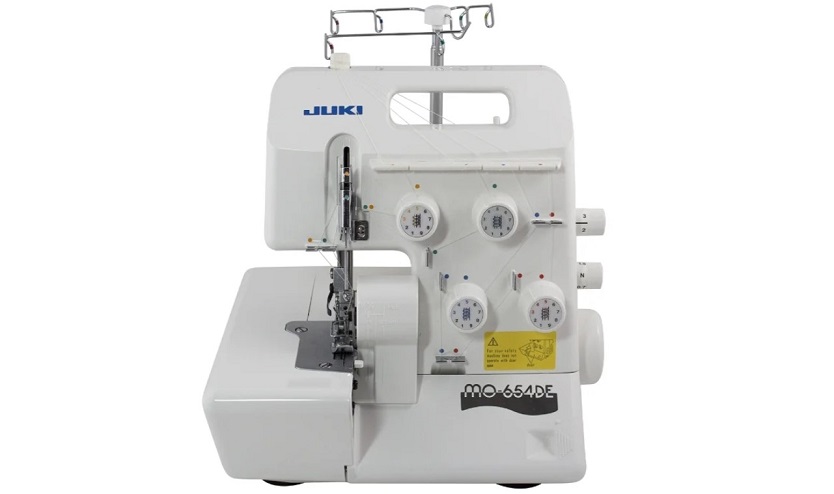
The model has a differential, looper threading in auto mode, a system that stabilizes the puncture force. The thread tension is manually adjustable. The knife is switchable, the pressure on the fabric and the width of its cut are regulated.
The overlocker works with 2, 3 and 4 strands. Performs 15 sewing operations, roll stitch and flatlock in total. The stitch is adjustable in length from 1 to 4 mm, in width from 2 to 6 mm. The foot rises up to 8 mm. The machine can sew up to 1500 stitches per minute. Color markings on the body. Soft case.
Advantages:
- Easy customization.
- Not capricious about the choice of threads and fabrics.
- Stable on the surface.
- Easy maintenance.
- All set of accessories and operations necessary for household use.
- High quality seams.
- Convenient lower looper refueling.
- High speed of work.
Disadvantages:
- Waste collection container missing.
- Does not include a sleeve platform.
Juki MO-51EN
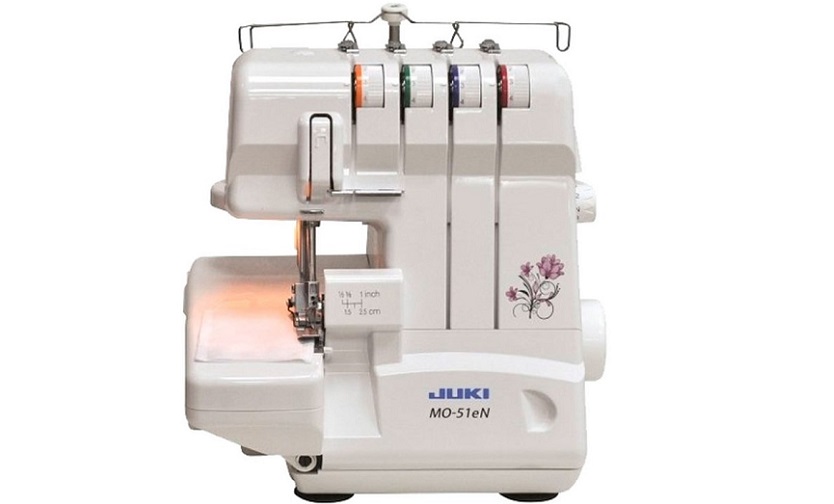
Model with a high customer rating, its average price . Equipped with differential and looper refueling. The thread tension is manually adjustable. The knives are turned off, the pressure to the fabric and the width of its cut are adjustable.
The overlocker works with 3 and 4 threads, performs a total of 7 sewing operations, rolled stitch, flatlock and chain stitch. The stitch is adjustable in length - from 1 to 4 mm, width from 4 to 6 mm. The foot rises up to 6 mm. The intensity of the work is 1300 stitches per minute. Equipped with a hose platform, waste tray and soft cover.On the body color marking.
Advantages:
- Silent work.
- High quality stitching.
- Simple settings.
- Chain stitch.
- Sleeve platform.
- Waste collection tray.
- Just thread the thread.
- Easy to customize.
- High speed.
Disadvantages:
- Does not work with two threads.
Juki pe 670
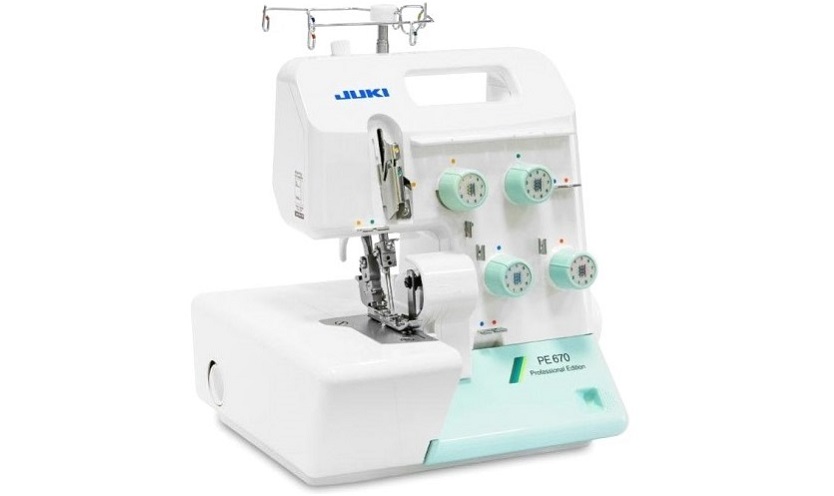
The average price of the next representative is . There is a differential, and the level of thread tension is controlled manually. It works with 3 and 4 threads, performs a role seam. The stitch is adjustable in length from 1 to 4 mm, in width from 3 to 7 mm. Raising the presser foot up to 8 mm. Sewing intensity - 1500 stitches per minute. Color markers on the case for easy care and maintenance.
Advantages:
- Speed of work.
- Works well with knitwear.
- High quality seams.
- High rise of a foot.
- Stable on the surface.
Disadvantages:
- There is no platform for the sleeve.
- No looper refueling system.
Juki MO-55E
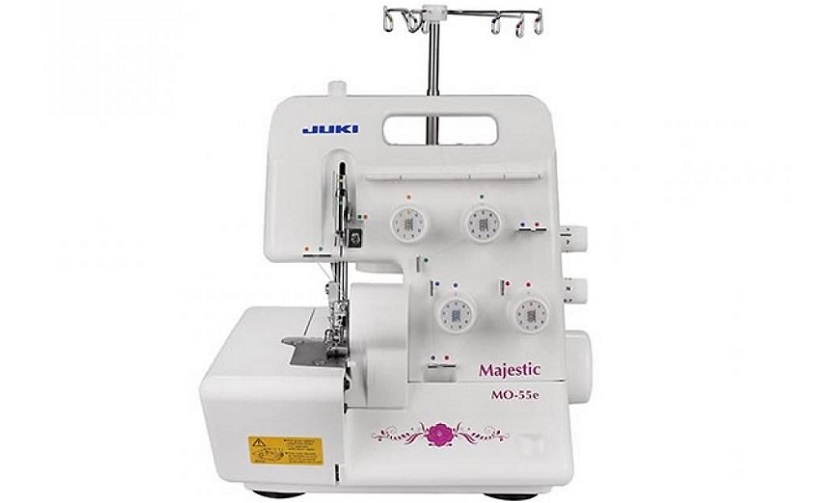
Overlock works with 2, 3 and 4 threads. Performs role seam and flatlock. The stitch is adjustable in length up to 4 mm, in width up to 7. Speed of work is up to 1500 stitches per minute. A removable sleeve platform is included. Color markers on the housing for easy maintenance. The knife is turned off, there is no needle and looper filling. The thread tension is controlled manually, there is a differential.
Advantages:
- Simple operation and easy settings.
- Unpretentious to the choice of threads.
- Sleeve platform.
- Speed of work.
- A set of functions necessary for everyday life.
Disadvantages:
- There is no automatic looper and needle refill system.
Juki pe 770
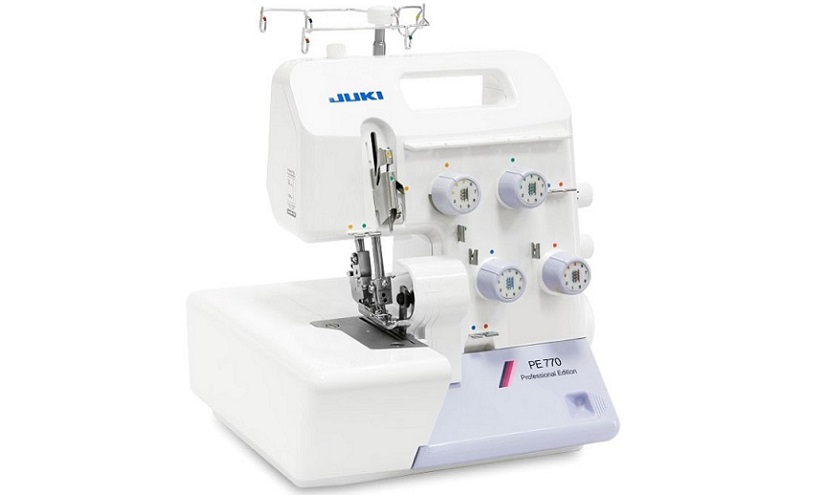
Power 105 watts., There is a differential and an automatic control system for tensioning the threads. Works with 2, 3 and 4 threads. Performs a role seam. The stitch is adjustable in length from 1 to 4 mm, in width from 3 to 7 mm. The foot rises to 8 mm. Speed up to 1,500 stitches per minute. The casing is color coded for easy care and adjustment.
Advantages:
- Unpretentious to the choice of fabric.
- Easy refueling.
- The threading pattern is shown on the housing.
- A large number of functions.
- Works with 2, 3 and 4 threads.
Disadvantages:
- There is no automatic needle and looper system.
Juki b-850
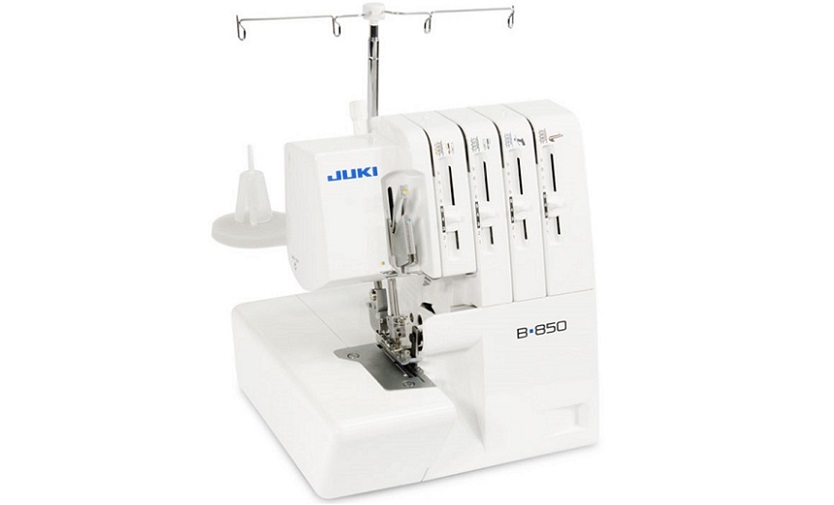
Power 105 W, there is a differential and automatic looper refueling. The clamp to the matter is adjustable, it works with 3 and 4 threads. Performs a total of 8 sewing, role seam and flatlock operations. The stitch is adjustable in length from 1 to 4 mm, in width from 3 to 7 m. The foot rises to 8 mm. The speed of 1500 stitches per minute. On the body color marking.
Advantages:
- High quality seams.
- Speed and performance.
- It works quietly, stably stands on the surface.
- Not capricious to the choice of fabric.
- Large feature set.
Disadvantages:
- Does not work with 2 threads.
- There is no cover and sleeve platform.
Juki b-950
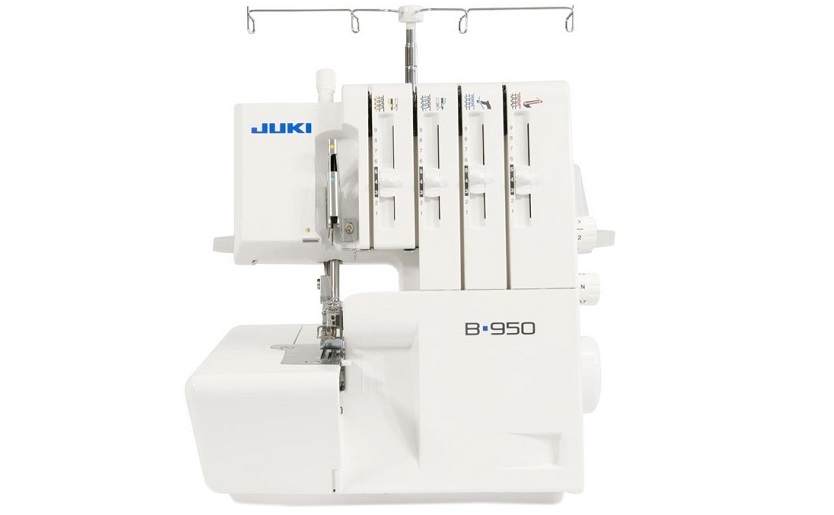
There is a differential, looper gas station and material pressure adjustment. Works with 2, 3 and 4 threads. Performs a total of 15 sewing, role seam and flatlock operations. The stitch is adjustable in length from 1 to 4 mm, in width from 3 to 7 mm. The foot rises to 8 mm. Speed up to 1,500 stitches per minute.
It is completed with a hard cover. On the body color marking. An additional feature is the weakening of the thread when raising the presser foot, which occurs automatically, the upper looper converter.
Advantages:
- Performs quality seams.
- Not capricious to the choice of fabrics and threads.
- Just customizable.
- Large feature set.
- Speed of work.
Disadvantages:
- There is no sleeve platform included.
Juki MO-75E
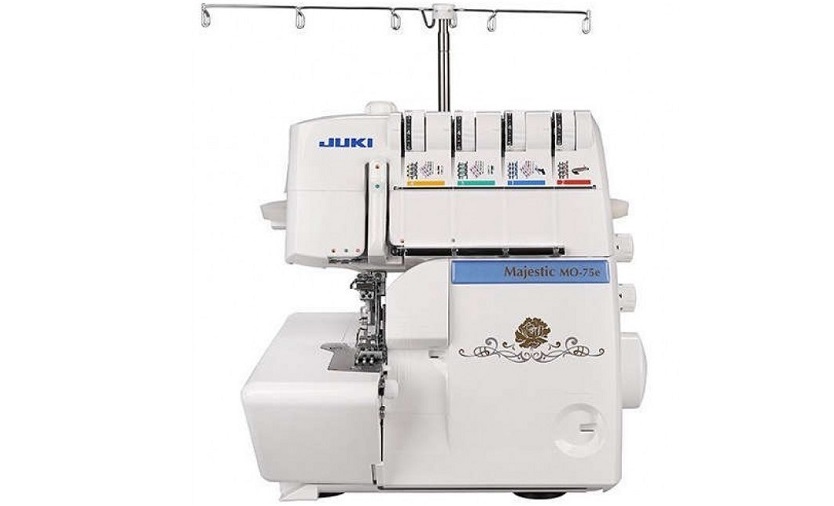
Model from an expensive segment with an average cost . For this price, the company offers a power of 105 watts. There is a differential. Thread tension is controlled manually. The pressure on the fabric is adjustable. Works with 2, 3, 4 and 5 threads. Performs role seam, flatlock and chain stitch. Stitch length up to 5 mm, width up to 7 mm. Work intensity up to 1300 stitches per minute.
The device is equipped with a removable platform for the sleeves. Color markers on the case. There is a box for collecting waste. A soft case is included.
Advantages:
- Quality seams.
- High functionality.
- Speed of work.
- Ease of use.
- Sensitive pedal.
- Unpretentious to threads and fabrics.
- Rich equipment.
Disadvantages:
- Little information in the instructions.
Juki PE 1500
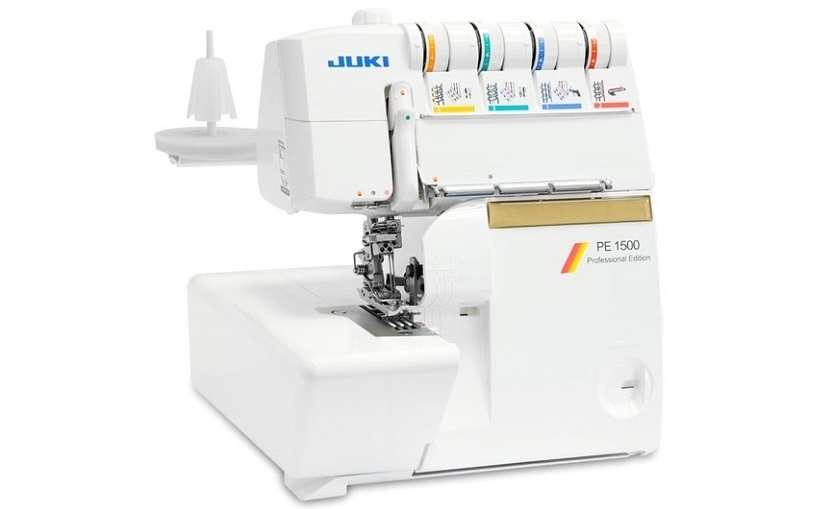
Completes the TOP model in . Power 105 watts. There is a differential, refueling looper in automatic mode. Thread tension is automatically controlled. Works with 2, 3, 4 and 5 strands. Performs a rolled and chain stitch. Stitch adjustment 1-4 mm in length, 5-11 mm in width. The foot rises to a maximum of 8 mm. Speed up to 1,500 stitches per minute.
Color-coded on housing for easy maintenance. Complete with waste compartment and accessory tray, interchangeable knife and offset pivot foot for perfect flat seams. Additional functions include the presence of a system for direct threading, threading the looper in automatic mode, blocking when the lid is opened.
Advantages:
- Unpretentious to the selection of threads and fabrics.
- Works with 2, 3, 4 and 5 strands.
- High functionality.
- Speed.
- Performs neat and high quality seams.
- Simple use, quick and easy to deal with maintenance.
Disadvantages:
- High price.

